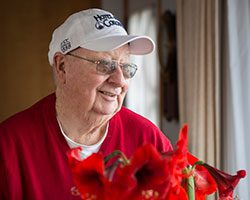Raymond Scheller
87-year-old heart patient enjoys better quality of life with family
St. Elizabeth doctors replace diseased heart valve without open heart surgery
One day, Raymond Scheller realized that he could not walk to his own mailbox in Villa Hills without panting and running out of breath. Sure, he’s in his 80s, but Raymond wants to stay active and healthy as long as possible.
Raymond worked for 22 years as a pharmacist at St. Elizabeth. Now, in retirement, he and his wife, Joyce, enjoy spending time with their seven children and 15 grandchildren. And he wants more energy to continue taking care of their home and yard.
To find out why he was short of breath, Raymond decided to see Dr. P. Gregory Houlihan, a Cardiologist with the St. Elizabeth Heart & Vascular Institute.
Dr. Houlihan identified Raymond’s medical issue — aortic stenosis. “Raymond had moderate aortic stenosis, a narrowing of his aortic heart valve that restricts blood flow. With activity, he was experiencing shortness of breath,” explains Dr. Houlihan. “Symptoms get worse over time and need aggressive treatment, eventually requiring surgical intervention.”
Some people don’t notice any symptoms until their blood flow becomes significantly reduced.
Signs of aortic stenosis include:
- Breathlessness.
- Chest pain, pressure or tightness.
- Fainting.
- A feeling of heavy pounding heartbeats.
- Decline in activity or reduced ability to do normal activities.
- Heart murmur.
Before this time, Raymond did not have any serious heart issues. However, he had a heart murmur throughout his life that doctors kept an eye on. “It was a loud, strong murmur. All the nurses and medical students would come in and listen to it,” said Raymond. “They couldn’t get over how loud it was.”
Aortic stenosis becomes severe; restricts blood flow
As Raymond’s primary cardiologist, Dr. Houlihan kept a close eye on Raymond’s aortic stenosis. By monitoring echocardiograms and symptoms such as shortness of breath, Dr. Houlihan discovered that Raymond’s aortic stenosis had progressed to a severe state.
A buildup of calcium restricted the flow of blood through his aortic valve — a condition that often happens as people grow older. “Once the valve becomes hardened, it doesn’t open as much and you’re not getting as much blood out to the brain and the rest of the body,” explains Dr. Houlihan. “Eventually, this becomes fatal.”
New procedure restores blood flow —TAVR
To help correct the problem, Dr. Houlihan referred Raymond for evaluation and treatment at the St. Elizabeth Structural Heart and Valve Center.
There, doctors suggested a relatively new, minimally invasive procedure called transcatheter aortic valve replacement (TAVR). TAVR is a way to replace the old, diseased aortic valve with a new, artificial valve. Since open heart surgery is not required with TAVR, pain is greatly reduced and recovery is much quicker. “They told me that TAVR could help me survive longer,” says Raymond, age 87. “I have a lot of confidence in the doctors at St. Elizabeth. So I decided to go ahead and have it done.”
Using a catheter, doctors threaded a new, collapsible replacement valve up into Raymond’s diseased valve. As they expanded the new valve, it pushed the old valve out of the way and began to better regulate blood flow.
TAVR was a success; open heart surgery not necessary
Raymond’s TAVR procedure was a success. He was out of the hospital in two days, much sooner than if he had open heart surgery. “Typically, TAVR patients feel better right away,” explains Dr. Houlihan, “even as they wake up from surgery.” Within a month, Raymond started at St. Elizabeth’s Cardiac Rehabilitation program, where he exercises to get stronger.
Meanwhile, Raymond will see Dr. Houlihan for periodic checkups. He appreciates the expert care he received from the heart specialists at St. Elizabeth. “I felt safe in their hands,” says Raymond. “They helped me get more time to see my family and enjoy life.”

Learn More About TAVR
TAVR is a treatment for patients with severe aortic stenosis who are not candidates for traditional valve surgery. It offers an option for patients who otherwise would have limited life expectancies without treatment. For more information about treatment options for heart valve problems, including the TAVR procedure, call the St. Elizabeth Heart & Vascular Institute Structural Heart and Valve Center at (859) 301-8287 (TAVR).

